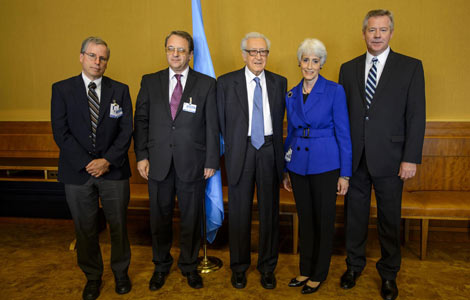Internet tops as forum to fight graft
Updated: 2013-06-26 06:49
By He Na (China Daily)
|
||||||||
New media have become the top channel for exposing corruption cases, doubling the number revealed in traditional media, an annual report shows.
From 2010 to 2012, 156 corruption cases were exposed by websites and mobile Internet platforms - twice the number exposed by newspapers, radio and television, according to the 2013 Annual Report on the Development of New Media in China released in Beijing on Tuesday.
The report was written by the Chinese Academy of Social Sciences, a government think tank.
"New media have greatly changed people's way of participating in the discussion and administration of State affairs. Anti-corruption on the Internet is a completely new method of media supervision and has incomparable superiority - in terms of speed and scope - compared with traditional media," said Tang Xujun, deputy director of the Institute of Journalism and Communication at the academy.
The opinions of corruption whistle-blowers broadcast on the Internet have the ability to yield great pressure on the government to quickly investigate cases and respond to the public, he said.
During the past decade, the number of corruption cases revealed online has increased sharply. The Internet as a corruption watchdog has become a new and necessary addition to China's battle against graft, experts said in response to the report's release.
With low cost and high anonymity, the exposure of corruption cases online can protect the safety of sources and ease fears of being identified, encouraging netizens to act, the report said.
In addition, instead of the long process of investigation for the traditional petition system, Internet corruption disclosure improves efficiency and saves time by presenting evidence, such as photos, video and audio, directly to the public platform.
"However, combating corruption on the Internet is also a double-edged sword, and the opinions of the social network community are diverse and contradictory sometimes," said Liu Xuzhou, deputy director of the School of Journalism and Communication at China University of Political Science and Law.
China's netizen population reached 564 million at the end of 2012, and registered users of the mobile text application Weixin, or WeChat, exceeded 300 million.
"It's inevitable that some users abuse their right to free speech and release false information to attract attention or vent personal anger."
This false information infringes on people's privacy and leaves a negative effect on the Internet environment.
Therefore, government departments need to strengthen efforts to step up Internet supervision and foster a good cyber environment to enhance those regulations, he added.
hena@chinadaily.com.cn
(China Daily USA 06/26/2013 page7)

 S African worries about Mandela's condition
S African worries about Mandela's condition
 Looted relics to return home this week
Looted relics to return home this week
 Astronauts go out of Shenzhou X's return capsule
Astronauts go out of Shenzhou X's return capsule
 Djokovic, Williams, and China's Li win openers
Djokovic, Williams, and China's Li win openers
 Russia, US disagree plan for Syria talks
Russia, US disagree plan for Syria talks
 Cooling off, the traditional way
Cooling off, the traditional way
 Surviving climber safe at home
Surviving climber safe at home
 Warning on college majors
Warning on college majors
Most Viewed
Editor's Picks

|

|

|

|

|

|
Today's Top News
4 Chinese killed in Papua New Guinea
US-China agree to boost corporate transparency
Global rating firm to rival 'Big Three'
New canal a lifeline for energy
China, EU hold human rights dialogue
Shenzhou X spacecraft mission a success
Riots in Xinjiang kill 27
Americans struggle over smartphones on vacation
US Weekly

|

|







